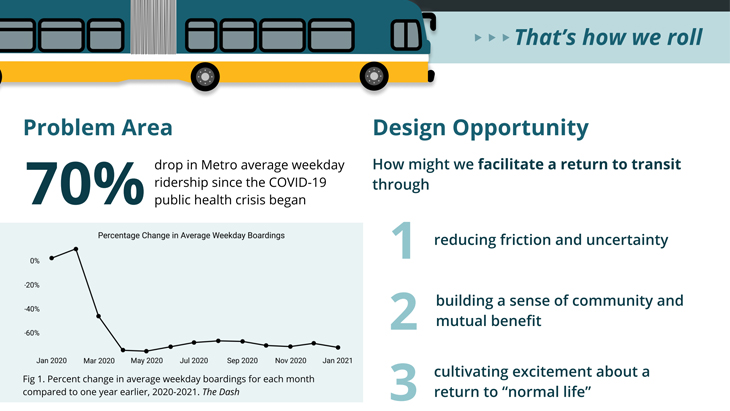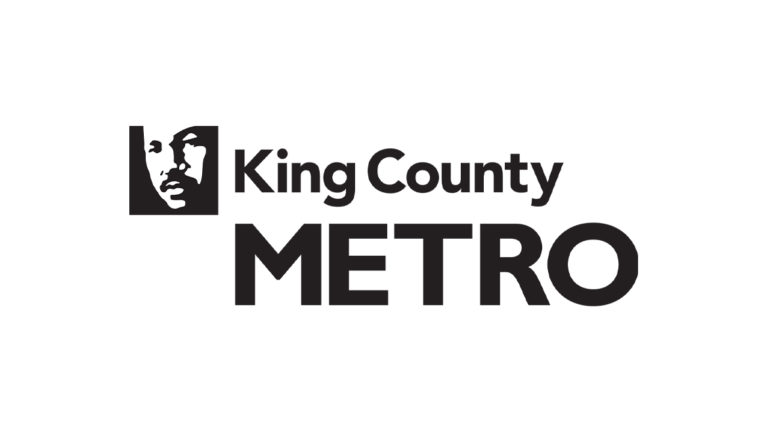
Issue
Since the beginning of the COVID-19 pandemic in King County, Washington, King County Metro has faced a 70% drop in weekday ridership on its buses. As the county emerges from the pandemic, safety and reliability concerns could mean public transportation lags behind.
Spark
Sustained lower transit ridership has negative implications for climate and road congestion, as well as disabled, elderly, and lower-income passengers who rely on transit. That was the challenge taken on by Kari Bergstedt, Lexi Rohrer, Lena Tran, and Theresa Tran, undergraduate members of a capstone team from the University of Washington’s Human Centered Design & Engineering program.
Overview
To determine how to get people back on transit, the team conducted a marketing audit across industries, performed primary customer research, and held weekly meetings with communications leaders at King County Metro, the leading transit agency for the Puget Sound region. This work culminated in a landscape analysis report to help transit agencies better understand customer mindsets and a campaign strategy that appeals to the motivations that will encourage riders to return.
Innovation
Insights from research and stakeholders informed the development of three campaign concepts. The themes of each concept are also applicable to other communities struggling with similar post-pandemic declines in ridership. The campaigns were centered around different user needs:
- “That’s how we roll” centered on the ideas of mobility and building rider confidence
- “Reconnect” focused on an emotional appeal to community and social connection
- “Welcome back” aimed to cultivate excitement about reopenings
Each concept was tested with lapsed riders to gauge appeal and usefulness of information, and “That’s how we roll” emerged as the proven winner.
Materials
- View the campaign pitch deck
- Read the process book
- View the team’s project video
Impact
On June 7, 2021, the UW HCDE capstone team presented a campaign pitch detailing the “That’s how we roll” campaign to an audience of transportation management professionals from King County Metro, Sound Transit, Seattle Department of Transportation, the City of Bellevue, and the Washington State Department of Transportation. Their pitch included research and visual assets, and a strategy to implement the campaign through multiple communication channels. The research findings and recommended strategic, creative, and marketing approaches are intended to be helpful for all transit agencies, as well as for other businesses and organizations looking to instill confidence as they welcome customers back.
At the HCDE Capstone Showcase event, held June 7-8, 2021, a panel of judges awarded the “That’s how we roll” project with the outstanding undergraduate award for communication.
Media Coverage
June, 2021 | HCDE Blog | Project: Return to Transit Marketing Campaign
Human Centered Design & Engineering students generate winning campaign to bring King County residents back to transit
Team
About the Capstone Team: The University of Washington Capstone team driving this project is made up of four Human Centered Design & Engineering Students. Human Centered Design & Engineering is an interdisciplinary major focused on making technology more usable, accessible and equitable. The team’s specialty in researched backed design and focus on users was crucial in the development of this campaign. Kari Bergstedt and Lena Tran acted as primary graphics and UX designers for this project, Theresa Tran was the team’s primary UX researcher, and Lexi Rohrer acted as the main project manager.
About King County Metro: King County Metro is the Puget Sound region’s largest public transportation agency. Metro provides bus, paratransit, vanpool, and water taxi services, and operates Seattle Streetcar, Sound Transit Link light rail, and Sound Transit Express bus service. Metro is committed to providing safe, equitable, and sustainable mobility, and prioritizing service where needs are greatest.
About the Mobility Innovation Center: A partnership between Challenge Seattle and the University of Washington, the Mobility Innovation Center tackles specific transportation challenges affecting the Puget Sound region, using applied research and experimentation. Housed at CoMotion, UW’s collaborative innovation hub, the multi-disciplinary center brings together the region’s leading expertise from the business, government, and academic sectors to use technology and innovation to find transportation solutions. Challenge Seattle is a CEO-led, private-sector initiative working to address issues that will determine the future of our region.
Academic Department
- HCDE
Faculty Leadership
Contributors
- Kari Bergstedt
- Lexi Rohrer
- Lena Tran
- Theresa Tran

